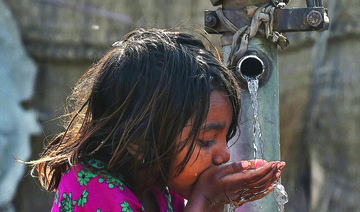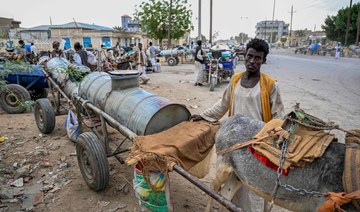BEIRUT: Syrian government forces are nearing the last major town held by Daesh in Homs province, part of their multi-pronged advance toward the jihadist group’s strongholds in the east of the country, a military source said on Thursday.
The source said combat operations would accelerate toward the town of Al-Sukhna, some 50 km (30 miles) from the administrative frontier of Deir Al-Zor province, where Daesh has redeployed many fighters after losing ground in Syria and Iraq.
“Capturing Al-Sukhna means opening the door and path for forces to move to Deir Al-Zor directly,” the source told Reuters, adding that the military had captured positions 8 km (5 miles) southwest of the town on Wednesday evening.
Daesh is losing ground fast in Syria to separate campaigns waged by the Russian-backed Syrian government on the one hand, and to US-backed Kurdish forces and their allies on the other.
Government forces, backed by the Russian air force and Iran-backed militias, have also been advancing against Daesh in Hama province and in southern areas of Raqqa province.
US-led operations against Daesh are currently focused on taking Raqqa city.
Government forces have been approaching Al-Sukhna gradually since capturing the ancient city of Palmyra, some 50 km away, in March.
“It is natural that combat operations escalate in this direction and take on a stronger and faster nature,” the source said, adding that Daesh had concentrated forces in Al-Sukhna.
The Syrian Observatory for Human Rights said the government forces were being supported in the attack by Russian air strikes and allied militias, and had moved to within 5 km of Al-Sukhna.
Deir Al-Zor province, which borders Iraq to the east, is almost entirely under Daesh control. The Syrian government has held on to a pocket of territory in the provincial capital of Deir Al-Zor city, and at nearby air base.
Syrian army troops push towards Daesh stronghold of Deir Al-Zor
Syrian army troops push towards Daesh stronghold of Deir Al-Zor

Hamas response to Gaza ceasefire proposal ‘consistent’ with principles of US plan, leader says

- Egypt and Qatar said on June 11 that they had received a response from the Palestinian groups to the US plan
“Hamas and the (Palestinian) groups are ready for a comprehensive deal which entails a ceasefire, withdrawal from the strip, the reconstruction of what was destroyed and a comprehensive swap deal,” Haniyeh said, referring to the exchange of Israeli hostages for Palestinian prisoners.
On May 31, Biden laid out what he called a “three-phase” Israeli proposal that would include negotiations for a permanent ceasefire in Gaza as well as phased exchanges of Israeli hostages for Palestinian prisoners held in Israel.
Egypt and Qatar — which along with the United States have been mediating between Hamas and Israel — said on June 11 that they had received a response from the Palestinian groups to the US plan, without giving further details.
While Israel said Hamas rejected key elements of the US plan, a senior Hamas leader said that the changes the group requested were “not significant”.
Red Sea crisis intensifies economic strain on Yemenis ahead of Eid

- Sales have decreased by 80 percent
- Over 1.2 million civil servants have not received salaries in eight years, and hundreds of thousands have lost their jobs
DUBAI: Yemen, suffering from nearly a decade of civil war, now faces an additional challenge: a crippled economy further strained by the escalating crisis in the Red Sea.
Market vendors in Sanaa’s Old City, the Al-Melh, claim that sales have decreased by 80 percent, according to a report by Chinese news agency Xinhua.
Shopkeepers attribute this decline to recent increases in sea shipping costs, which have driven up wholesale prices.
This situation reflects the broader economic crisis in Yemen, where rising sea shipping costs have increased prices across the board, making basic Eid essentials unaffordable for many.
To help ease financial strain, an exhibition was organized in Al-Sabeen Park, where families were able to sell homemade goods.
Despite these efforts, Yemen’s economic problems persist. According to the UN, the decade-long war has pushed millions into poverty. Over 1.2 million civil servants have not received salaries in eight years, and hundreds of thousands have lost their jobs. The Norwegian Refugee Council reports that four out of five Yemenis face poverty, and over 18 million people urgently need humanitarian aid.
Water crisis batters war-torn Sudan as temperatures soar

- The country at large, despite its many water sources including the mighty Nile River, is no stranger to water scarcity
- This summer, the mercury is expected to continue rising until the rainy season hits in August
PORT SUDAN, Sudan: War, climate change and man-made shortages have brought Sudan — a nation already facing a litany of horrors — to the shores of a water crisis.
“Since the war began, two of my children have walked 14 kilometers (nine miles) every day to get water for the family,” Issa, a father of seven, said from North Darfur state.
In the blistering sun, as temperatures climb past 40 degrees Celsius (104 degrees Fahrenheit), Issa’s family — along with 65,000 other residents of the Sortoni displacement camp — suffer the weight of the war between Sudan’s army and the paramilitary Rapid Support Forces (RSF).
When the first shots rang out more than a year ago, most foreign aid groups — including the one operating Sortoni’s local water station — could no longer operate. Residents were left to fend for themselves.
The country at large, despite its many water sources including the mighty Nile River, is no stranger to water scarcity.
Even before the war, a quarter of the population had to walk more than 50 minutes to fetch water, according to the United Nations.
Now, from the western deserts of Darfur, through the fertile Nile Valley and all the way to the Red Sea coast, a water crisis has hit 48 million war-weary Sudanese who the US ambassador to the United Nations on Friday said are already facing “the largest humanitarian crisis on the face of the planet.”
Around 110 kilometers east of Sortoni, deadly clashes in North Darfur’s capital of El-Fasher, besieged by RSF, threaten water access for more than 800,000 civilians.
Medical charity Doctors Without Borders (MSF) on Friday said fighting in El-Fasher had killed at least 226.
Just outside the city, fighting over the Golo water reservoir “risks cutting off safe and adequate water for about 270,000 people,” the UN children’s agency UNICEF has warned.
Access to water and other scarce resources has long been a source of conflict in Sudan.
The UN Security Council on Thursday demanded that the siege of El-Fasher end.
If it goes on, hundreds of thousands more people who rely on the area’s groundwater will go without.
“The water is there, but it’s more than 60 meters (66 yards) deep, deeper than a hand-pump can go,” according to a European diplomat with years of experience in Sudan’s water sector.
“If the RSF doesn’t allow fuel to go in, the water stations will stop working,” he said, requesting anonymity because the diplomat was not authorized to speak to media.
“For a large part of the population, there will simply be no water.”
Already in the nearby village of Shaqra, where 40,000 people have sought shelter, “people stand in lines 300 meters long to get drinking water,” said Adam Rijal, spokesperson for the civilian-led General Coordination for Displaced Persons and Refugees in Darfur.
In photos he sent to AFP, some women and children can be seen huddled under the shade of lonely acacia trees, while most swelter in the blazing sun, waiting their turn.
Sudan is hard-hit by climate change, and “you see it most clearly in the increase in temperature and rainfall intensity,” the diplomat said.
This summer, the mercury is expected to continue rising until the rainy season hits in August, bringing with it torrential floods that kill dozens every year.
The capital Khartoum sits at the legendary meeting point of the Blue Nile and White Nile rivers — yet its people are parched.
The Soba water station, which supplies water to much of the capital, “has been out of service since the war began,” said a volunteer from the local resistance committee, one of hundreds of grassroots groups coordinating wartime aid.
People have since been buying untreated “water off of animal-drawn carts, which they can hardly afford and exposes them to diseases,” he said, requesting anonymity for fear of reprisal.
Entire neighborhoods of Khartoum North “have gone without drinking water for a year,” another local volunteer said, requesting to be identified only by his first name, Salah.
“People wanted to stay in their homes, even through the fighting, but they couldn’t last without water,” Salah said.
Hundreds of thousands have fled the fighting eastward, many to the de facto capital of Port Sudan on the Red Sea — itself facing a “huge water issue” that will only get “worse in the summer months,” resident Al-Sadek Hussein worries.
The city depends on only one inadequate reservoir for its water supply.
Here, too, citizens rely on horse- and donkey-drawn carts to deliver water, using “tools that need to be monitored and controlled to prevent contamination,” public health expert Taha Taher said.
“But with all the displacement, of course this doesn’t happen,” he said.
Between April 2023 and March 2024, the health ministry recorded nearly 11,000 cases of cholera — a disease endemic to Sudan, “but not like this” when it has become “year-round,” the European diplomat said.
The outbreak comes with the majority of Sudan’s hospitals shut down and the United States warning on Friday that a famine of historic global proportions could unfold without urgent action.
“Health care has collapsed, people are drinking dirty water, they are hungry and will get hungrier, which will kill many, many more,” the diplomat said.
UAE, Iran discuss bilateral relations

DUBAI: The United Arab Emirats Minister of Foreign Affairs, Sheikh Abdullah bin Zayed, had a phone conversation on Saturday with Iran's acting Minister of Foreign Affairs, Ali Bagheri Kani, to discuss the bilateral relations between the two countries.
During the call, they exchanged Eid Al-Adha greetings and explored ways to enhance cooperation that would serve the mutual interests of their countries and peoples, contributing to regional security and stability.
They also reviewed several issues of common interest, as well as recent developments in both regional and international arenas.
Two explosions near vessel off Yemen’s coast, UK maritime office says

- Houthi militants, who are backed by Iran, have been targeting vessels off the Yemen’s coast
CAIRO: The United Kingdom Maritime Trade Operations (UKMTO) said on Sunday a vessel 40 nautical miles south of Al-Mukha in Yemen had reported two explosions nearby, adding that the vessel and its crew were safe and proceeding to their next port of call.
Authorities are investigating, UKMTO said.
UKMTO WARNING INCIDENT 087 ATTACK UPDATE 001https://t.co/fX3hWupi7g#MaritimeSecurity #MarSec pic.twitter.com/tOQXLZoQ9w
— United Kingdom Maritime Trade Operations (UKMTO) (@UK_MTO) June 16, 2024
Houthi militants, who are backed by Iran, have been targeting vessels off the Yemen’s coast in what they said is a show of solidarity with the Palestinians being killed in Israel’s war on Gaza.













